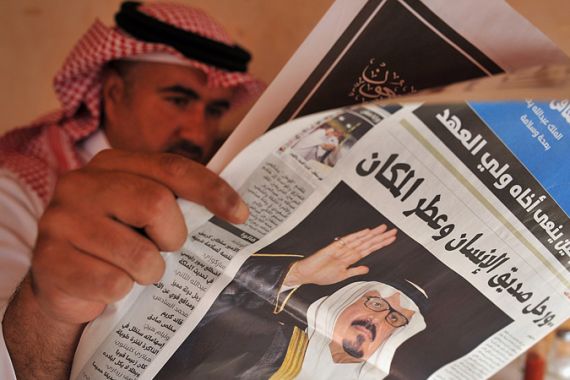Arab countries divided over media credibility
Many in Egypt and Tunisia remain distrustful of news media, says new research on media habits in the Middle East.

Doha, Qatar – People in some Arab countries appear to be divided when it comes to trusting the credibility of their national news agencies, according to the results of a recently conducted survey of media habits in the region.
Preliminary results of the survey, released on Wednesday during a session of the Qatar Media Industries Forum in Doha, showed that a majority of adults in Saudi Arabia, Jordan and the United Arab Emirates believed their news media to be “credible”.
However, in Egypt, Lebanon and Tunisia, only a quarter of those surveyed trusted the credibility of their media outlets, according to results of the survey of nearly 10,000 adults conducted by Northwestern University in Qatar (NU-Q).
“This is a particularly interesting phenomenon in Lebanon, as this is thought to be a country with ‘free press'”, Everette Dennis, dean and CEO of NU-Q, said in a statement.
Over a four-month period, researchers from Harris Interactive surveyed 9,693 adults in eight Arab countries – Egypt, Qatar, Tunisia, Bahrain, Lebanon, Saudi Arabia, Jordan, and the UAE – in an effort to show how people use media, particularly news media, following the “Arab Spring” that began in 2011.
Kerry Hill, a research director at Harris Interactive, described the survey as “the largest study in the region for public release on media use”.
Freedom of expression
The research highlighted a seeming paradox: A majority in most of the countries surveyed said they thought people should have the freedom to express their opinions on the internet, even when these views are unpopular. An especially high number in Saudi Arabia and the United Arab Emirates agreed.
Yet at the same time, about half of respondents also said they support tighter regulation of the internet in their countries, with a somewhat higher percentage saying so in Qatar, Lebanon, and Saudi Arabia.
Humphrey Taylor, the chairman of the Harris Poll, said it is “very common to find this kind of apparent contradiction” – noting that in the United States during the Cold War, large majorities said they supported the principle of freedom of speech, yet objected to allowing speech supporting Communism.
The Gulf gap
The survey data highlighted a big gap between the wealthy Gulf countries and less affluent Arab nations to the west. Overwhelming majorities in the Gulf have internet access, including about 9 in 10 people in Qatar and the United Arab Emirates. But just 46 percent are connected in Jordan and 22 percent in Egypt. (Yemen has the lowest internet penetration rates in the region: a scant 2 percent, according to a 2011 Gallup poll.)
Egypt and the small island state of Bahrain are close to polar opposites in terms of media habits. Hill described Egypt as “very media-poor, with the exception of TV” – whereas Bahrainis are voracious consumers of all types of media, with large numbers saying they use social media sites and read books, magazines, and newspapers.
When asked about the top news sources they consume, about a quarter of those across the region named Al Jazeera, followed by Saudi Arabia-based Al Arabiya at 16 percent and social networking website Facebook at 10 percent.
Google was found to be the most popular news source among Bahrainis, Facebook among Tunisians, LBC among Lebanese, Al Hayat among Egyptians, and Al Arabiya in Saudi Arabia. Al Jazeera topped the list in Qatar, the United Arab Emirates and Jordan.